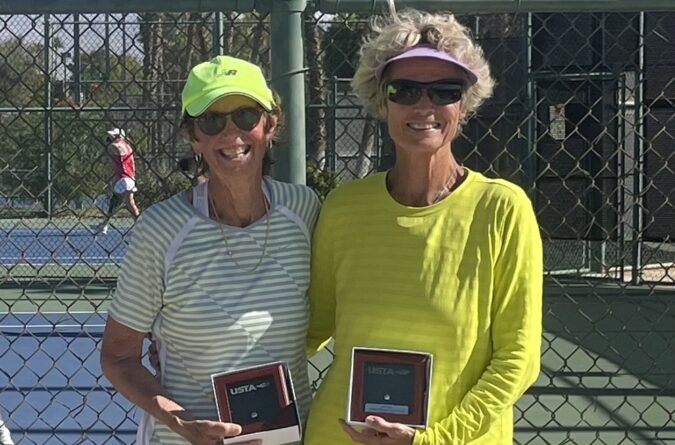Meet the world’s best senior tennis player – a 76-year-old grandmother who is ranked number one (right in a green shirt).
Gwenda Ward, a retired high school English teacher from Ocala, Florida, is top in the world in doubles for her age group, and number one in the US for singles and doubles.
She started playing aged 10 – but being one of five girls in her family, money was tight so they just hit the ball for hours on the tennis court and against a brick wall Johnson Hagood Stadium in Charleston, South Carolina.
The mom-of-two rose to the heights of winning city and state tournaments – but it wasn’t until she retired she really honed her craft.
After retiring in 2016, aged 67, Ward devoted herself to improving her game – training both physically and mentally.
And she won the world doubles championships, and the US singles and doubles this year.
Gwenda plays two to three hours a day, five days a week, and eats healthy – fruits, vegetables and protein – every year. “Your nutrition is very important,” she said.
“At 67, in my final year of teaching, I trained for six months for, and ran, my first marathon,” she said. “Finished fourth in my age group.
“My goal when I retired was to be the best player I could be.
“I worked on controlling my mind and focus. Distractions like wind, noise, or a broken string would throw me off.
“I worked with a pro who taught me to reorient my mind and focus on the next point.”
Ward credits her longevity in the sport to good health and a proactive mindset. “I’m fortunate to have good genes — no knee replacements, hip replacements, or surgeries,” she said.
“I always strive to be a better person and a better mother, and a better tennis player. Peak athletic performance is not limited to one’s 20s to 50s,” she said.
“If you believe you can achieve something and are willing to do the work, goals can be achieved.”
Ward came from sporty parents.
“I first started playing tennis when I was 10 or 11,” Ward shared. “My mother was Canadian and a tennis champion at 17 years old, and my dad was an All-American athlete.
“They had five daughters, and we always played tennis. We weren’t rich, so we didn’t have country club lessons or fancy pros. We just hit the ball for hours and hours every day.
“My very first job was turning on the night lights at the tennis courts,” she recalled. Anybody who housed and took care of turning on the lights at night, I collected a quarter.”
In the 1960s, Ward became one of the first female athletes at the University of South Florida.
“I won my state championship as a senior in high school, got my tennis scholarship, and then dropped out when I got married,” she recalled.
“But I continued playing, and at 35, I won mixed doubles with a partner of mine. That was just one step in a long road.”
Her journey hasn’t been without its challenges.
In 2022, Ward lost her husband to pancreatic cancer, a difficult time made worse by the COVID-19 pandemic.
“It was just a horrible time,” she said. “But a month after he passed, I thought, ‘I’m playing tennis. I might as well compete against the world’s best.’
“And I did — I got to the finals of the consolation at the World ITF competition in Florida. My tennis friends were so supportive during that time. It’s something I’ll never forget.”
This camaraderie has been a constant source of strength for Ward.
“Women at this age have all lost somebody — husbands, sisters, mothers. It’s been a bonding experience. Now it’s my turn to give back.
“My doubles partner in Turkey had just lost her husband two months earlier, and I was so happy to help her win gold. That’s the human side of tennis, and that’s the side I live and enjoy.”
She also attributes her success to her son’s transformation academy, which helped her break through mental barriers.
“Once I got over those hurdles, I could finally let the best player in me come out. It’s a joy I can’t even describe.”
Ward’s dedication has brought her incredible success.
She’s represented the United States in International Tennis Federation team events, winning gold in doubles and bronze in mixed doubles.
“My doubles partner and I didn’t lose a match this year. We only dropped five games, which is pretty phenomenal given the level of competition,” she said.
Her passion for tennis extends beyond competition.
“It takes me to all kinds of interesting places, and I meet wonderful people. Tennis is a marvelous sport you can play for a lifetime. As long as I’m able to play at this level, I’ll continue.”
Ward’s ability to adapt and think critically has been key to her success.
“Tennis takes smarts,” she explained. “If your opponent has a great serve, you have to quickly analyze how to neutralize it.
“The surface matters too — playing on hard court, clay, grass, or indoors all requires different strategies. It’s a great game, and I’m glad I’ve figured out what works for me.”
Reflecting on her progress, Ward remains grateful for the lessons learned through loss and persistence.
“I was brutally honest about the mistakes or bad tennis. After any loss, my pro and I worked hard on any weaknesses in my game.
“I keep getting better, and it’s a matter of staying fit and getting smarter.
“I’m so glad I made the right moves with my health, my training, and my mental game. It’s given me the opportunity to be the player I want to be — and that’s all I could ever ask for.
“Tennis is a great sport for enduring friendships, lifelong athletic challenges and rewards, and opportunities to travel the world,” she added. “Can any other sport offer as much?”
Michael Lee Simpson
Senior US Reports



